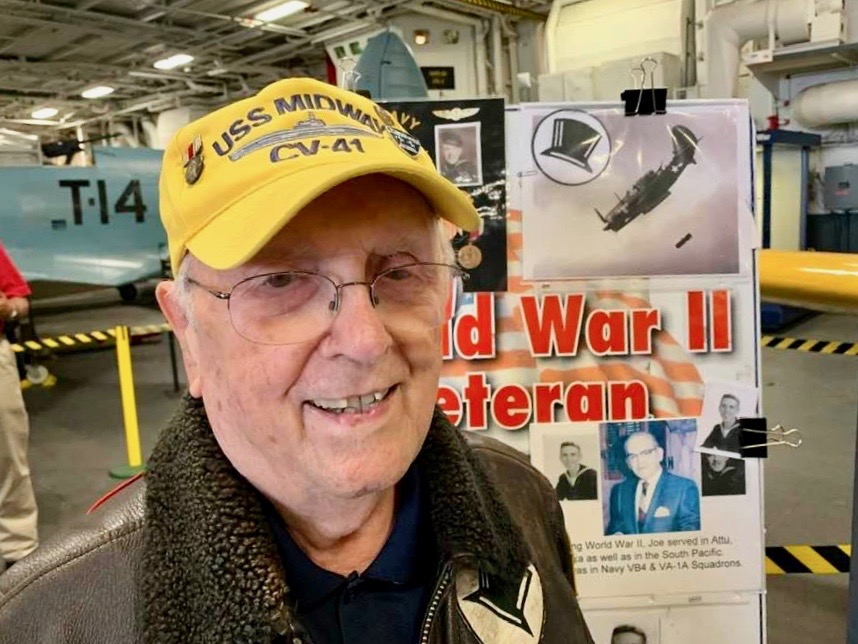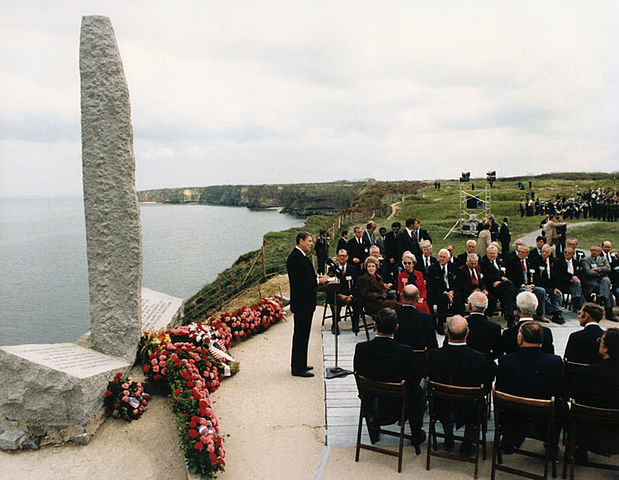Resources on History – Military
Look closely at the photograph to the right of this WWII veteran – a carrier-based Helldiver torpedo bomber manned by a 20-year-old pilot and 17-year-old tail gunner, Joe Neves. Now 92, he is the last surviving WWII veteran to serve with the Navy’s famed Tophatters squadron. Mr. Neves found out about the bombing of Pearl Harbor as he exited a movie theatre in New York City on December 7, 1941. Determined to fight for his country, he had to wait three years until he was 17 and old enough to enlist. I was honored to meet and speak with him last week. He gave me a signed copy of an artist’s rendering of his plane. He told me to…
Read MoreToday is the 75th anniversary of D-Day, the commencement of the Allied invasion of continental Europe. Within a year, Hitler was dead and the Nazi reign of terror over. President Ronald Reagan’s 1984 speech at Normandy marked the 40th anniversary of the invasion. Reagan used the opportunity not only to honor the allied soldiers who fought their way ashore, but also to strengthen NATO’s resolve in the face of threatened Soviet nuclear missile deployments to Eastern Europe. I introduced my high school rhetoric and debate students to this speech as one of the great presidential addresses of the 20th century. I recommend listening to the entire 13-minute speech. My father, George Thomas Wingard, Jr., fought in Europe later in…
Read MoreHalsey’s Typhoon (Robert Drury and Tom Clavin) is the gripping story of Task Force 38, and its desperate struggle to survive a devastating typhoon on December 17-18, 1944. By the end of the storm, three destroyers rested on the ocean floor and nearly 800 sailors lost their lives, almost as many American deaths as in the Battles of Midway and Coral Sea combined. Under the leadership of Admiral William “Bull” Halsey, TF 38 was operating in waters 300 miles east of the Philippines. Charged with keeping Japanese planes based on Luzon out of the air during MacArthur’s Philippine campaign, Hasley chose to keep his fleet in station even as the surprise storm intensified. A number of the ships, unable to…
Read MoreThis week marks the 75th anniversary of the Battle of Midway, the decisive turning point in the Pacific war. Fought June 4-6, 1942, America sank four Japanese aircraft carriers, a military setback from which Japan never recovered. Ian Toll observes: In the American view, Midway eliminated the risk of a Japanese attack on Hawaii or the west coast of North America. As important, it relieved political pressure on FDR to transfer a greater share of forces to the Pacific, freeing him to emphasize his great priority, which was to keep the Soviet Union in the war against Germany. In that sense, the Battle of Midway ratified and confirmed the vital ‘Europe-first’ strategy. For that reason, it ranks as one of the most essential…
Read MoreMy interest in America’s Pacific War (1941-1945) began in elementary school. One of our readers included the story of Jimmy Doolittle’s Tokyo Raid. I was captivated by the stunning story of 16 Army B-25 Mitchells that were outfitted for this unique objective and flown by specially trained crews. Launched from an American aircraft carrier that had slipped to within several hundred miles of Japan’s coast, the odds of survival were slim. Theirs was a no-return mission. After dropping their bombs, the crews headed for destinations in China and Russia, harrowing escape attempts that led to freedom for some, and prison, torture, and death for others. Doolittle’s Raid came less than six months after Pearl Harbor. The enemy was caught off guard and…
Read MoreSeventy-five years ago today Japanese forces attacked American military installations in Hawaii. A day later President Franklin Roosevelt requested Congress for a declaration of war with Japan. Listen his speech here. It concludes: Hostilities exist. There is no blinking at the fact that our people, our territory, and our interests are in grave danger. With confidence in our armed forces- with the unbounding determination of our people- we will gain the inevitable triumph- so help us God. I ask that the Congress declare that since the unprovoked and dastardly attack by Japan on Sunday, December 7, 1941, a state of war has existed between the United States and the Japanese Empire.
Read More
